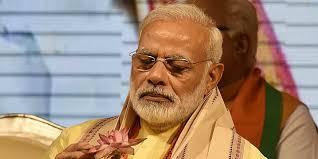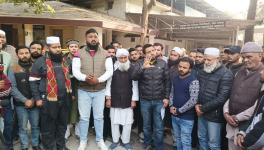OBC Sub-Categorisation: Repositioning the Subaltern Castes in BJP’s Electoral Arithmetic

Image Courtesy: Huffpost
Politics is ironical. The same party that toppled the V. P. Singh government based on the Mandal Commission’s recommendations, the same party whose patrons refuse to underscore the caste divisions and bats for the idea of Akhand Bharat, is now claiming to be the savior of social justice. The social engineering of BJP has a connotation different from the one being discussed by social scientists. BJP’s social engineering is aimed at transforming the subaltern castes into tools of upper caste Hindus, as had become apparent from role played by various social groups post Godhra riots in Gujarat.
The phrase social engineering usually refers to a grand coalition of the subaltern castes – OBC, Dalit, Muslim and Adivasi against the socio political domination of upper caste dominated political parties. But BJP succeeded in giving it a different connotation, by subtly creating a wedge between these castes in order to sustain its regressive social polarization. The decision to sub-categorise the single block of Other Backward Castes is seen by analysts as one being consolidated by BJP’s age old experiences from Madhya Pradesh, Rajasthan, Bihar, and Uttar Pradesh. The idea of sub-categorisation has a chequered history, starting when Mr L. R. Naik, a member of the Mandal Commission, proposed to divide the OBCs into intermediate backward classes and depressed backward classes, in his dissent note.
The administrative efforts to sub-categorise the OBC block, having about three decades of history, finally started taking shape in 2014. The BJP government created a three member committee to turn it into a political decision to bell the cat. The timing of this move is underscored by the political compulsion to secure votes of the most backward castes who feel that the so called reservation benefits are yet to trickle down to them. It is well proved with none other than Narendra Modi’s reference to the commission while inaugurating the Bhagpat express highway during the by-polls in Uttar Pradesh to woo the most backward castes. It is a known fact that over the past seven decades, the reservation policy in place has failed to ensure justice by giving a leg up to those who most needed it. However, it does not mean that the policy has failed all together. It helped a section among the backward castes who could become new entrants into state apparatus joining the ranks of neo-rich. But at the same time, the reservation policy rearticulated caste cleavages and boosted the same caste system which is often deemed to be the bane of the Hindu social order.
This slicing of the cake is an extension of the electoral policy successfully used by the Bharatiya Janata Party (BJP) in Uttar Pradesh by courting the non-Yadav backward castes and the non-Jatav Dalits to wean them away from the Yadav-dominated Samajwadi Party and the Jatav- dominated Bahujan Samaj Party. As usual, BJP bhakts are out to showcase how favorable BJP is, when it comes to catering the interests of the most backward castes among the OBC block.
With this, a few issues come up for discussion; first, whether the said move of is the brain child of BJP/ Modi government, second, whether the government is beoing influenced by the necessities of political exigencies, third, whether the BJP government, headed by Narendra Modi, has any holistic approach towards the issues, and lastly, how it is going to impact the states where categorization is already underway and the reservation quota is proportionately distributed.
The modus operandi of the BJP administration is evident even in the process of appointment of the said commission. On August 23, 2017, top guns in the Modi administration, Amit Shah and Arun Jaitley had talked about the ensuing Commission for sub-categorisation of Other Backward Classes. Amit Shah, well before the Parliament took up constitutional status of the National Commission for Backward Classes, said in a statement that the various BJP state governments’ attempts of sub-categorising the OBC had proved beneficial, and the Modi government was inclined to scale up the task to the national level. The Finance minister, while briefing the Cabinet decisions to the press, not only mentioned that the cabinet will soon set up a commission to examine sub-categorisation of Other Backward Classes in the central list of reserved categories, but also made it clear, well before the proposal was brought before the Cabinet in September, that “The proposed commission would submit its report within 12 weeks from the day of chairman is appointed.”
Let’s consider the facts first. The National Commission for Backward Classes proposed a holistic approach in its communication to the Ministry of Social Justice on 2nd March, 2015. The NCBC, in response to a mandate served to it with reference to No. 1025/14/2011-BC-II, of 2014, passed a resolution in its meeting on 18th February, 2015, conceding the idea of sub-categorisation of centrally listed OBCs into three umbrella categories. Thus, like many other so called initiatives of this Government, the idea and process for sub-categorisation was also already in the pipe line under the previous government.
The second question is whether the Modi government had done its homework before belling the cat. The NCBC, in its recommendation to the Government two years back, clearly stated the questions for consideration. It asked the Union government to examine, “(i) a policy decision of the Government to go ahead, with this nationwide exercise of Sub-Categorisation within the OBCs; (ii) an in-principle approval of the Government for the methodology, the number of sub-categories and other issues related thereto as indicated in the report, (iii) Agree to provide necessary funding for undertaking this nationwide project with the help of an expert body like ICSSR.”
The NCBC felt that these important measures are necessarily important for delivery of social justice. That is why the NCBC warned the government to ensure ICSSSR guidance while reclassifying the OBCs into three new categories. In Commission’s words, “After the first phase is over, for identifying the respective castes/communities/sub-caste/synonyms, and to put them into their deserved category… it is again proposed to utilize the services of an expert body like ICSSR, who would be requested to undertake a country wide exercise and prepare state-wise list of OBCs as per the indicators and methodology proposed above in the respective categories.” It also recommended provisioning of special funds for country wide exercise, constitution of ICSSSR expert group by drawing renowned academics from each state belongs to OBCs. The verbatim of the government decision clearly short circuits the nationwide exercise by the expert group under guidance of ICSSR for a better and rational outcome. Instead of undertaking a nationwide special study oriented exercise to meet the occasion, the BJP government cut short the whole exercise to the level of standard government enquiry committee mode.
To assess the quantum of inequitable distribution of benefits of reservation is a laborious process, given the fact that as of today, there are 2683 centrally listed Other Backwards Castes. Minister for Social Justice and Empowerment, T. C. Gehlot, said that they had data for 5000 castes. If this data was generated by the Socio-Economic and Caste Census, of which, caste-based data is withheld from public scrutiny, they should be reminded that it does not have any question relating to the reservations. Banking on that data would only open the Pandora’s Box! Most importantly, the period the newly constituted commission is allowed to function is only three months and the composition of the committee is not representing at least the states where such categorization is already in vogue.
Lastly, whether the NCBC’s suggestions are factored or not in the final report is something that is going to affect the states where a certain kind of categorization is already under implication, particularly in south India. Similarly, the Mandal recommendations consolidated the dominant caste phenomenon, which helped regional satraps. The final recommendations with any grouping and regrouping of existing categories will cause a tectonic shift in ground level social and political mobilizations, which in turn will become a politically fertile ground for the expansion of the BJP into the states where they are not in power. This makes clear that the BJP government’s moves are based on electoral exigencies, rather than compulsions of equitable social justice. Thus, the grandly worded exercise of the BJP government is bound to end up mismanaging the show, similar to what happened with demonetization. Let the nation be ready to grasp the consequences of this well visualized, but short circuited act of political expediency.
According to media reports, the said commission got three extensions, and is finally in the stage of compiling reports. Unlike Mandal commission, which toured the country at large and gave an opportunity to a vast section of people, both individuals and social groups, to petition, Rohini commission’s functioning is more or less confined to the Delhi’s Vigyan Bhavan annexe, where the commission’s office is situated. Thus, it would have its limitations in terms of independent assessment of economic and social advancement of various castes that would eventually be termed as the most backward castes, and is hence bound to lead to claims and counter claims. Once the report is out, which is expected to happen soon, the national political arithmetic is bound to undergo tremendous change. We need to see whether the opposition parties are ready to swallow this decision, without protests.
Get the latest reports & analysis with people's perspective on Protests, movements & deep analytical videos, discussions of the current affairs in your Telegram app. Subscribe to NewsClick's Telegram channel & get Real-Time updates on stories, as they get published on our website.
























